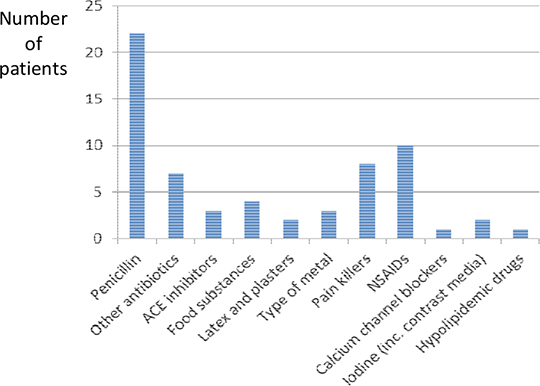Prevalence, nature and documentation of penicillin allergy in hospital inpatients Introduction Patients commonly report penicillin ‘allergies’, which may be true immune-mediated reactions to penicillin, such as delayed or immediate hypersensitivity, or dose-related adverse events. Over-reporting of penicillin allergy may preclude use of this clinically-important drug and lead to overuse of alternative antibiotics. We determined the prevalence and nature of reported penicillin allergies in hospital inpatients and audited documentation and prescribing of alternative antibiotics. 
Figure 1. All allergies reported by participants Methods Inpatients on medical and surgical wards over 10 days were included in the study, unless they lacked capacity or did not want to take part. Participants were questioned about penicillin use and drug allergies and inpatient drug charts were reviewed. Results 136 people were included (65±20years, 48% female). 122 (90%) reported ever having taken penicillin, 112 (82%) reported taking penicillin at least twice. 22 participants reported penicillin allergy (16% of participants, 20% of those reporting receiving penicillin at least twice). All reported allergies appeared to be true immune-mediated reactions, with 19 (14%) participants reporting skin rash and 3 (2%) reporting a reaction consistent with anaphylaxis. In total, forty three (32%) participants reported 63 allergies, with penicillin allergy being the most common (figure 1). People who reported penicillin allergy were more likely to report at least one other allergy (10 (46%)) than people who did not report penicillin allergy (21 (18%), p=0.009). Penicillin allergies were accurately documented on inpatient charts. However one serious allergy (anaphylactic reaction to aspirin) was not recorded. 64 (56%) people without penicillin allergy were treated with antibiotics, of whom 53 (83%) were prescribed a penicillin. 6 (27%) participants reporting penicillin allergy were treated with antibiotics, none of whom were prescribed penicillin. Discussion. Most people have taken penicillin at least once and most antibiotics prescribed are penicillins. This wide exposure may account for the high prevalence of reported penicillin allergy. Clinicians should be aware that penicillin allergy may signpost allergy to other drugs. Immediate hypersensitivity (an absolute contraindication to penicillin) is relatively rare. Most patients should therefore be able to receive penicillins or related drugs for life-threatening infection.
|


